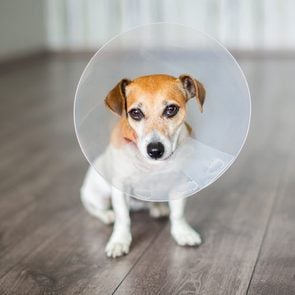Dogs That Have Dementia Might Experience It Like Humans, According to Study
Updated: Jul. 30, 2023

Changes in sleep habits in older dogs shouldn't be ignored and could be a sign of dementia.
Doggos love a good snooze. But if your best friend is elderly and having trouble sleeping, it could be a sign of dementia. It’s been known for some time that dogs can get dementia as they age, just like people. New research, though, shows just how similar the symptoms can be between humans and their pets.
According to a recent study, dogs with dementia appear to have sleep problems much like humans with dementia. These sleep problems may be one way your dog may be asking for help.
Do dogs with dementia have sleep problems?

In a study published in Frontiers in Veterinary Science, researchers recorded the brainwaves of 28 dogs between 10 and 16 years old by electroencephalogram (EEG) while they took a two-hour nap. Each dog had been evaluated on a range of canine dementia risk factors. Combining their data, the researchers found that dogs with higher cognitive impairment took longer to fall asleep and spent less time sleeping.
“Changes in sleep habits should be expected in older dogs, and could be a harbinger of decline in cognition,” said Natasha Olby, senior author of a study at North Carolina State University. There is no known cure for canine dementia, but studies like this one can help researchers begin to understand the affiliation.
What are other signs of canine dementia?
Beyond sleep problems, other signs of dementia in dogs include:
- disorientation
- changes in activity level
- less interest in social interactions with people
- Less or no response to commands
Dogs can also experience a lack of appetite and their housetraining may slip. They may stop letting you know they need to go outside to relieve themselves.
If your suspect your dog suffers from dementia, your veterinarian can prescribe medications to ease symptoms and recommend other steps, including nutritional supplements.
Source:
- Frontiers in Veterinary Science: Sleep and cognition in aging dogs. A polysomnographic study


